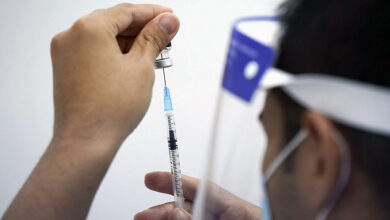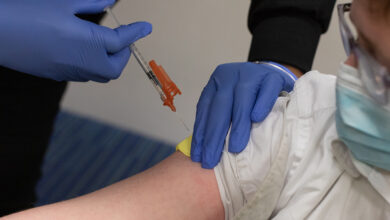Allergic reactions to Pfizer, Moderna COVID-19 vaccines focus of new clinical trial

[ad_1]
The National Institutes of Health (NIH) has launched a clinical trial to better understand allergic reactions related to the Moderna and Pfizer- BioNTech COVID-19 vaccines. The trial, which will involve 3,400 adults, 60% of whom have a history of severe allergic reactions or a diagnosis of mast cell disorder, will also consider the biological mechanism behind the reactions to see if a genetic pattern or other factors can better predict who is at risk of a reaction.
The participants will be split into two groups and be unaware as to if they are receiving a vaccine or placebo until after the second dose is administered and the observation period has concluded.
The Centers for Disease Control and Prevention (CDC) first reported on the instances of anaphylaxis weeks after the initial rollout of the COVID-19 vaccines. In rare cases, some recipients experienced adverse reactions such as severe allergic reactions within minutes of the vaccine being administered. As such, the agency issued guidance recommending that those who experienced anaphylaxis after the first dose not get the second, and that vaccine providers be equipped with epinephrine, antihistamines, blood pressure monitors and timing devices to check a patient’s pulse.
UK CORONAVIRUS VARIANT NOW ‘MOST COMMON LINEAGE’ IN US, WALENSKY SAYS
“The public understandably has been concerned about reports of rare, severe allergic reactions to the Moderna and Pfizer-BioNTech COVID-19 vaccines,” Dr. Anthony Fauci, director of the National Institute of Allergy and Infectious Diseases (NIAID), said in a news release. “The information gathered during this trial will help doctors advise people who are highly allergic or have a mast cell disorder about the risks and benefits of receiving these two vaccines. However, for most people, the benefits of COVID-19 vaccination far outweigh the risks.”
In the trial, researchers will collect blood, urine and nasal swabs from participants before the jab, and blood and urine after. The participants will also be monitored for at least 90 minutes after each injection. Researchers will analyze the proportion of study participants in each group who experienced a systemic allergic reaction within 90 minutes of either dose.
“If a significant number of systemic allergic reactions to either or both vaccines occur during the trial, investigators will analyze these biological samples to examine possible mechanisms for the reactions and whether certain genetic patterns are associated with higher risk,” the news release said.
CLICK HERE FOR COMPLETE CORONAVIRUS COVERAGE
The researchers expect to have results by late summer.
[ad_2]
Source link





